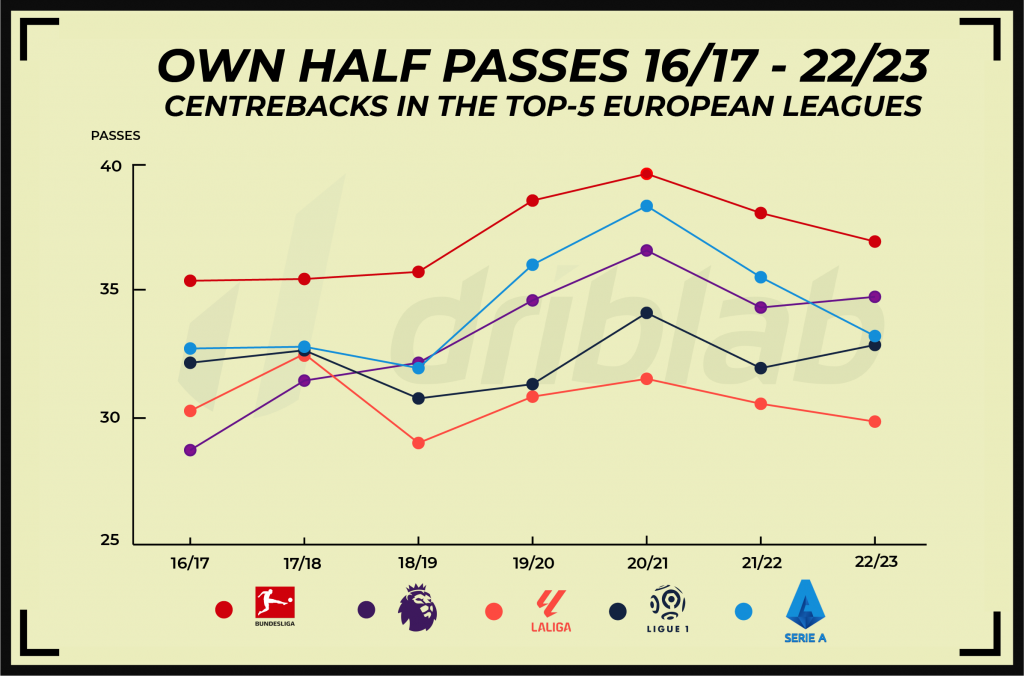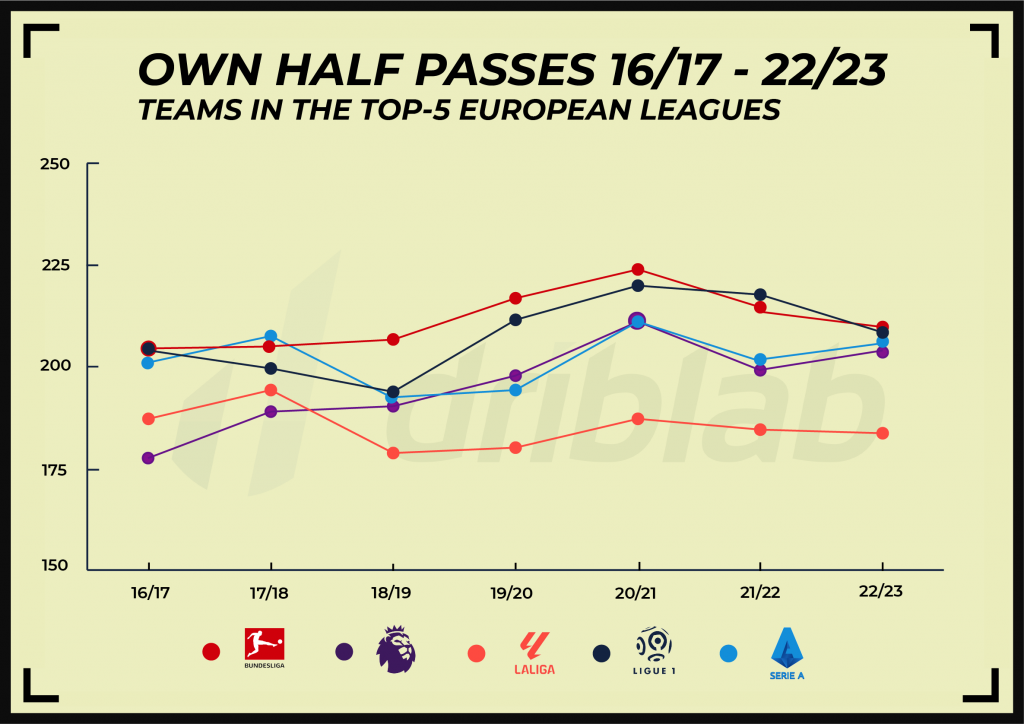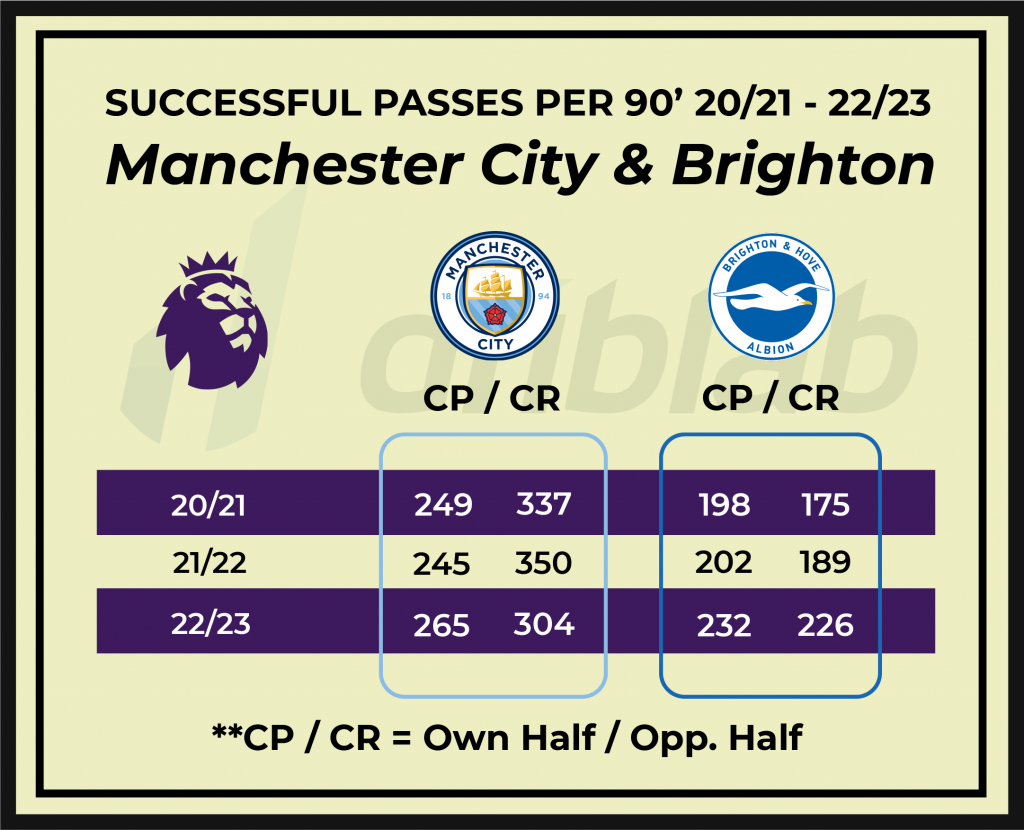Although there is no tangible and categorical way to conclude it, the importance of the coach has rarely been as intense as it is now. In-depth analysis, ideas and methodologies are becoming more and more precise and intellectually avant-garde and this is reflected in players and matches. We are witnessing much more complex ways of organising the game collectively than 15 or 20 years ago, and all these confrontations of ideas that are changing the game have a way of being measured.
Among the many analyses and readings on collective tendencies that we have been doing with data, aggressive forward pressing has been a constant, as well as its subsequent response: working from the back by bringing players closer to the ball and playing with the goalkeeper as an equally important piece as any other. It is therefore interesting to see how play in their own half has evolved in relation to what they have done in their opponents’ half.

Faced with pressing, the response has been to lower the midfield positions. Whereas players used to move away or fix areas, it is now more common for full-backs and midfielders to move closer to the defence and therefore for goalkeepers and full-backs to be part of more passes. Although the last two seasons have seen a drop in the number of passes in their own half per 90′, in the previous five seasons it is easy to see how they have been giving more, especially in the Bundesliga, Serie A and Premier League. Only centre-backs in Spain today make fewer own-field passes per 90′ than they did seven seasons ago according to our database.
This evolution, with a steady rise over five years, can also be seen on a collective level. Pending what will happen in the 23/24 season, teams have progressively increased their own-field participation, with the Covid-19 season being the high point, and then the trend has slowed down. This might lead one to think that teams with less possession and a low defensive height pass more in their own half when dominated but many of the teams that dominate use their own half as a stepping stone to being able to run into space in the opposition half.

Taking data from the Premier League over the last few seasons, we find that the top ranked teams have made more passes in their own half than in their opponents’ half per 90 minutes. Not only do they face more intense or frequent pressure but they repeat more passes, try to ensure controlled ball progression and do not risk long passes in order not to lose the ball. For example, a particularly paradigmatic case is that of Brighton, whose style of play is very marked by their way of waiting with the ball until the pressure comes, bringing players forward to find space behind the presser and then being very vertical in the opposition half when they have numerical equality to run out wide. The opposite is the case with Manchester City, a team that seeks to dominate and dominate the ball in the opposition’s half, closing down the opposition, taking them from one side to the other with very short passes and a lot of patience.

Although, depending on the team, more or less passes are made in their own half than in the opposition’s, the use of that first space is much more important than in the past. Never before, and this can be categorised, have the goalkeeper and the centre-backs been so important on the ball. Nowadays we can find goalkeepers with more than 90 passes in a match, being part of collective processes where playing the ball short to create long spaces is today an indisputable trend. A laboratory of ideas from which to create goals.
Founded in 2017 as a consultancy, Driblab has driven innovation through data in all aspects of professional football. Thanks to a transversal model, its database collects and models statistics in all directions. From converting matches and videos into bespoke data for training academies to developing cutting-edge technology, helping clubs, federations and representative agencies in talent scouting and transfer markets. Driblab’s smart data is used by clubs all over the world, with success stories such as Dinamo Zagreb, Real Betis and Girondins Bordeaux among others. Here you can find out more about how we work and what we offer.














